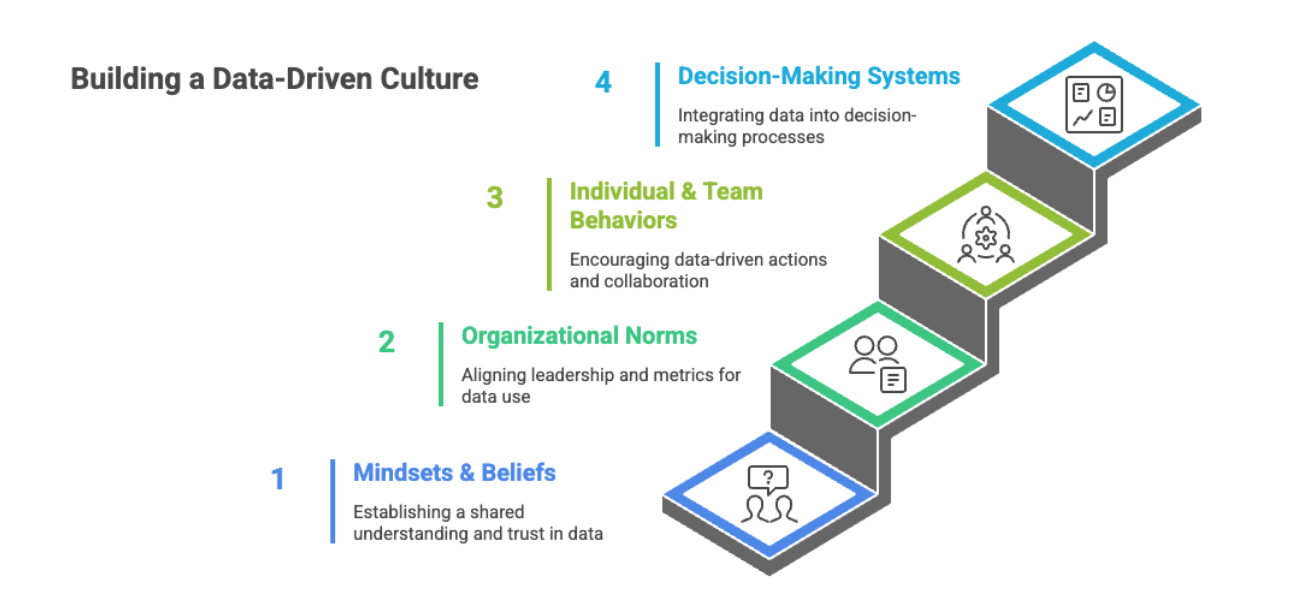
Building a Data Culture: Turning Information into Real Business Value
In 2025, nearly every company claims to be data-driven.
Yet, in many organizations, data remains underutilized — trapped in dashboards, siloed departments, or simply ignored when key decisions are made.
Digital transformation initiatives often fall short not because of a lack of data or technology, but because of something far more fundamental: the absence of a true data culture.
A data culture is not a slogan or a software tool. It’s a mindset, a set of practices, and a way of working that ensures data becomes a reliable driver of decision-making and innovation across all levels of the organization.

A Practical Framework for Data Culture
To move beyond buzzwords and measure progress, it’s helpful to break down data culture into four observable dimensions. This framework can help leaders assess where their organization stands — and where to focus when looking to unlock more value from data.
1. Mindsets & Beliefs
The values and assumptions people hold about data define how it’s used day-to-day. In a healthy data culture:
- Data is seen as a shared strategic asset, not an individual’s property.
- People trust data and feel accountable for its accuracy and integrity.
- Curiosity, questioning, and experimentation are encouraged and celebrated.
Key question: Do your teams see data as a burden, or as an enabler of collective success?
2. Organizational Norms
Culture is reinforced by the systems and structures that govern behavior. For data to have impact, organizations need to establish clear norms:
- Leaders lead by example, making data-driven communication and decisions the standard.
- KPIs, metrics, and definitions are aligned across teams, reducing confusion and misalignment.
- Collaboration between business units, technology, and data teams is trusted, ongoing, and fluid.
Key question: Are your teams aligned around a single version of truth, or do they argue with conflicting numbers?
3. Individual & Team Behaviors
Culture shows up in daily habits. In a strong data culture:
- Teams proactively engage data experts and analysts when solving problems.
- Ideas are challenged respectfully, using evidence rather than opinions.
- Teams share data responsibly and transparently, ensuring others can access and understand it when needed.
Key question: Are data and insights used to validate decisions — or just to justify them?
4. Decision-Making Systems & Processes
Finally, culture manifests in how decisions are made and reviewed. Organizations with a mature data culture:
- Use data consistently across all levels of decision-making.
- Respect intuition, but test it against evidence when appropriate.
- Track and revisit key decisions to learn from outcomes and improve over time.
Key question: Are decisions in your company made “because that’s how it’s always been done,” or are they continuously improved using evidence?
From Data Collection to Data Culture
Many companies invest heavily in data collection, BI tools, and analytics platforms, but fail to realize the expected value. Why? Because technology alone does not create insight — people and culture do.
Building a data culture is not an IT project. It’s an organizational transformation that blends leadership, behaviors, and structured processes to ensure data informs every key decision.
Where to Start?
1) Assess your current culture: Which of the four dimensions needs the most attention?
2) Run pilot initiatives: Start small, with teams open to experimentation and quick wins.
3) Embed data into everyday routines: Celebrate data-driven successes to reinforce behavior.
How mature is your company’s data culture?
If you’ve tried to become “data-driven” but something still isn’t clicking, this framework can help you identify where to focus first.
📩 Want to build a data culture that truly works?
Contact Xantage — our team helps organizations turn data into decisions, and insights into action.
From assessment to implementation, we guide you through every step of your data culture transformation.





.png)




.png)